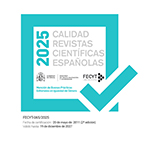Autoridades y conflictos de jurisdicción en “pueblos de indios”. Córdoba, Gobernación del Tucumán, 1750-1810
Resumo
En este artículo se aborda la administración de gobierno y justicia en los “pueblos de indios” de Córdoba entre 1750 y 1810, período caracterizado por el crecimiento demográfico de la mayoría de los pueblos que habían persistido hasta entonces, el final del proceso de disolución de la encomienda privada iniciado a principios del siglo XVIII y las reformas de los Borbones en el ramo de tributo, procesos que contribuyeron a fortalecer a las autoridades indígenas, a las que se asignaron responsabilidades de empadronamiento, cobro del tributo y administración de justicia. En primer lugar, se identifican atribuciones de caciques, alcaldes y regidores indígenas; a continuación, se examinan las competencias de gobierno, justicia y policía de otras autoridades (capitanes recaudadores de tributo, curas doctrineros, alcaldes de la hermandad y jueces pedáneos) sobre estos pueblos. Por último, se tratan las contiendas de jurisdicción entre ambos grupos de autoridades, que se produjeron por el ejercicio de la jurisdicción criminal sobre los pueblos y sus habitantes, especialmente los foráneos identificados como mestizos o “castas”. Estos temas se consideran en relación con el proceso de adaptación y resistencia al dominio colonial y el acceso de las sociedades indígenas a la justicia española.
Downloads
##submission.format##
Licença
La Revista Complutense de Historia de América, para fomentar el intercambio global del conocimiento, facilita el acceso sin restricciones a sus contenidos desde el momento de su publicación en la presente edición electrónica, y por eso es una revista de acceso abierto. Los originales publicados en esta revista son propiedad de la Universidad Complutense de Madrid y es obligatorio citar su procedencia en cualquier reproducción total o parcial. Todos los contenidos se distribuyen bajo una licencia de uso y distribución Creative Commons Reconocimiento 4.0 (CC BY 4.0). Esta circunstancia ha de hacerse constar expresamente de esta forma cuando sea necesario. Puede consultar la versión informativa y el texto legal de la licencia.











